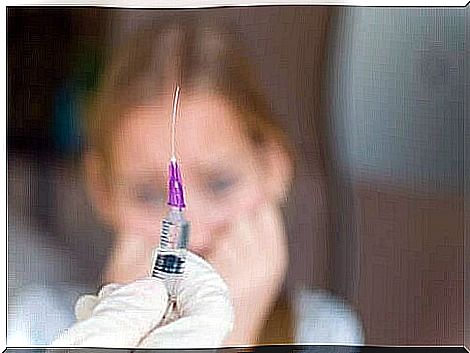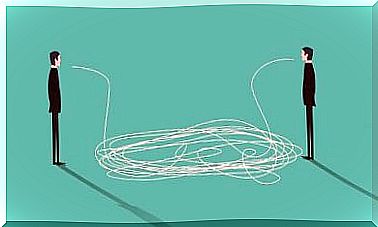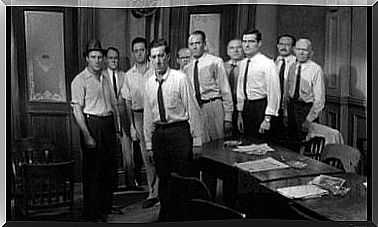Trypanophobia Or The Irrational Fear Of Needles

Trypanophobia or the irrational fear of needles is a very common phobia, which also has other names, such as belonephobia. In fact, some writers like to be more specific, and instead of calling the irrational fear of needles belonephobia and trypanophobia, they like to call it hype. In this article, we will use the term trypanophobia to refer to the phobia of needles and injections.
What is this fear about? What are its symptoms and possible causes? We will answer these questions. In addition, we will talk about the two most effective psychological therapies when we treat specific phobias like this.
Trypanophobia or the irrational fear of needles
Trypanophobia is a specific type of phobia (an anxiety disorder). The main characteristic is that it involves an excessive, intense and irrational fear of needles and injections.
While it is true that needles can cause harm if used incorrectly, the reality is that with this phobia (as with all specific phobias), the fear is disproportionate.
As you can see, one of the symptoms of phobias is that they interfere with the person’s daily life in some way. In addition to this, the irrational fear of needles also causes high discomfort to the sufferer.
Where does this phobic stimulus come from?
The phobic stimulus, in any specific phobia, is the one that causes anxiety or intense fear. In the case of trypanophobia, the dreaded object is needles, but also syringes or the possibility of receiving a vaccine. It is also important to note that in some cases, the individual fears elements related to needles or syringes. For example, hospital-like odors, stretchers and surgical materials, among others.
Symptoms
According to the criteria in DSM-5 (2014), the symptoms of trypanophobia are as follows:
- Intense and irrational fear of needles or injections.
- Avoidance of situations where these objects occur (or resistance with high discomfort).
- Clinically significant discomfort or disturbances in daily life.
We can further specify the symptoms of this phobia and group them into three categories:
- Physical symptoms. Shortness of breath, nausea, vomiting, dizziness and abdominal pain, among others.
- Cognitive symptoms. Catastrophic and irrational thoughts associated with needles, thoughts of death and confusion, among others.
- Behavioral symptoms. Avoidance of the dreaded stimulus (already mentioned above).
But when do the symptoms appear? Basically when the person is thinking, visualizing or touching needles. It can also happen when they go to the doctor’s office. In short, the symptoms will rise to the surface as the person goes through a situation related to needles.
Depending on the intensity of the phobia, the symptoms may or may not appear in certain situations. For some people, for example, it is more than enough to think about needles for the symptoms to appear. Others, however, must be in actual contact with the needle for this to happen.

Causes of trypanophobia
Various causes can explain trypanophobia or the irrational fear of needles. One of the most common causes is a traumatic experience related to needles. For example, having had a negative experience while taking a blood sample.
It is actually possible to explain this by using associative learning (classical conditioning), where the mind ends up associating a stimulus with a negative response. One of the key figures in this type of learning was the American psychologist John Watson. In the 1920s, he got a boy named Albert to be incredibly afraid of white rats.
However, like all phobias, it can also be acquired by substitute conditioning. For example, having a relative who suffers from trypanophobia and seeing how much it affects them. Finally, some authors claim that humans are biologically programmed (or predisposed) to develop certain types of phobias, especially those that allowed our ancestors to survive.
According to these theories, we develop certain phobias to manifest the giant or flight response, which will save us as a species. In fact, fear is latent in very primitive areas of the brain.
Treatment of the irrational fear of needles
From clinical psychology and according to the Guide to Effective Psychological Treatments by Pérez et al. (2010) and Caballo (2002), the two preferred treatments (the most effective) for the treatment of specific phobias are:
Exposure therapy
It consists of exposing the patient to the phobic stimulus in a progressive way. The therapist is responsible for doing this by the patient.
In the case of the irrational fear of needles, the person will be exposed to the phobic object in question. First by thinking about needles, then through pictures and videos and so on, so that they can touch them little by little, until they can get an injection, for example. The ultimate goal is for the person to face the situation without anxiety.
Cognitive therapy
Through cognitive therapy, more specifically cognitive restructuring, the intention is to modify the irrational and catastrophic thoughts that the patient shows with a view to their phobia. In case of irrational fear of needles, these can be for example “I will not cope with the pain of the needle” or “It will hurt me”. It is about replacing these thoughts with more realistic and functional ones.

The fear of needles and other related fears
The irrational fear of needles is often also linked to other phobias, such as hematophobia (fear of blood) or aichmophobia (fear of sharp objects). In other words, if you suffer from trypanophobia, it is likely that these other fears will also appear because the link is very simple.
In the case of hematophobia or aichmophobia, the psychological treatments used will be the same as for trypanophobia, but adapted to this specific phobia.
On the other hand, although cognitive therapy and exposure therapy have been shown to be the most effective therapies in this type of disorder, other options may also help combat phobias, such as psychoeducation, mindfulness, and cognitive behavioral therapy.
Remember that if you feel that phobia is interfering with your daily life, it would be best to go to a professional who specializes in the case (ideally a clinical psychologist).









